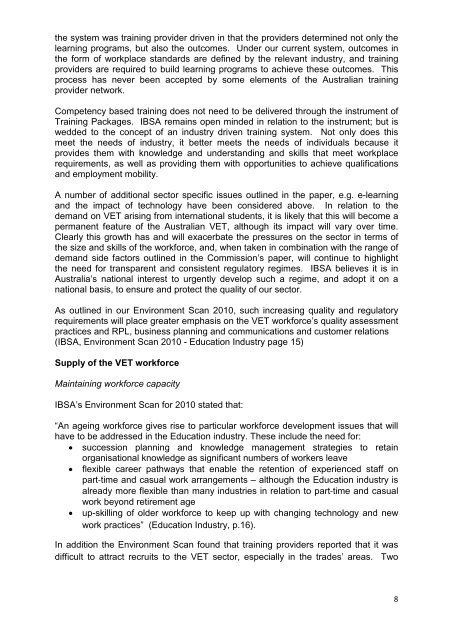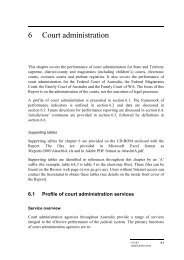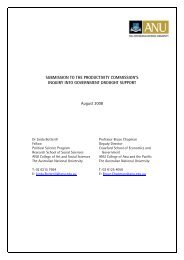Innovation & Business Skills Australia - Productivity Commission
Innovation & Business Skills Australia - Productivity Commission
Innovation & Business Skills Australia - Productivity Commission
Create successful ePaper yourself
Turn your PDF publications into a flip-book with our unique Google optimized e-Paper software.
the system was training provider driven in that the providers determined not only the<br />
learning programs, but also the outcomes. Under our current system, outcomes in<br />
the form of workplace standards are defined by the relevant industry, and training<br />
providers are required to build learning programs to achieve these outcomes. This<br />
process has never been accepted by some elements of the <strong>Australia</strong>n training<br />
provider network.<br />
Competency based training does not need to be delivered through the instrument of<br />
Training Packages. IBSA remains open minded in relation to the instrument; but is<br />
wedded to the concept of an industry driven training system. Not only does this<br />
meet the needs of industry, it better meets the needs of individuals because it<br />
provides them with knowledge and understanding and skills that meet workplace<br />
requirements, as well as providing them with opportunities to achieve qualifications<br />
and employment mobility.<br />
A number of additional sector specific issues outlined in the paper, e.g. e-learning<br />
and the impact of technology have been considered above. In relation to the<br />
demand on VET arising from international students, it is likely that this will become a<br />
permanent feature of the <strong>Australia</strong>n VET, although its impact will vary over time.<br />
Clearly this growth has and will exacerbate the pressures on the sector in terms of<br />
the size and skills of the workforce, and, when taken in combination with the range of<br />
demand side factors outlined in the <strong>Commission</strong>’s paper, will continue to highlight<br />
the need for transparent and consistent regulatory regimes. IBSA believes it is in<br />
<strong>Australia</strong>’s national interest to urgently develop such a regime, and adopt it on a<br />
national basis, to ensure and protect the quality of our sector.<br />
As outlined in our Environment Scan 2010, such increasing quality and regulatory<br />
requirements will place greater emphasis on the VET workforce’s quality assessment<br />
practices and RPL, business planning and communications and customer relations<br />
(IBSA, Environment Scan 2010 - Education Industry page 15)<br />
Supply of the VET workforce<br />
Maintaining workforce capacity<br />
IBSA’s Environment Scan for 2010 stated that:<br />
“An ageing workforce gives rise to particular workforce development issues that will<br />
have to be addressed in the Education industry. These include the need for:<br />
• succession planning and knowledge management strategies to retain<br />
organisational knowledge as significant numbers of workers leave<br />
• flexible career pathways that enable the retention of experienced staff on<br />
part‐time and casual work arrangements – although the Education industry is<br />
already more flexible than many industries in relation to part‐time and casual<br />
work beyond retirement age<br />
• up-skilling of older workforce to keep up with changing technology and new<br />
work practices” (Education Industry, p.16).<br />
In addition the Environment Scan found that training providers reported that it was<br />
difficult to attract recruits to the VET sector, especially in the trades’ areas. Two<br />
8

















